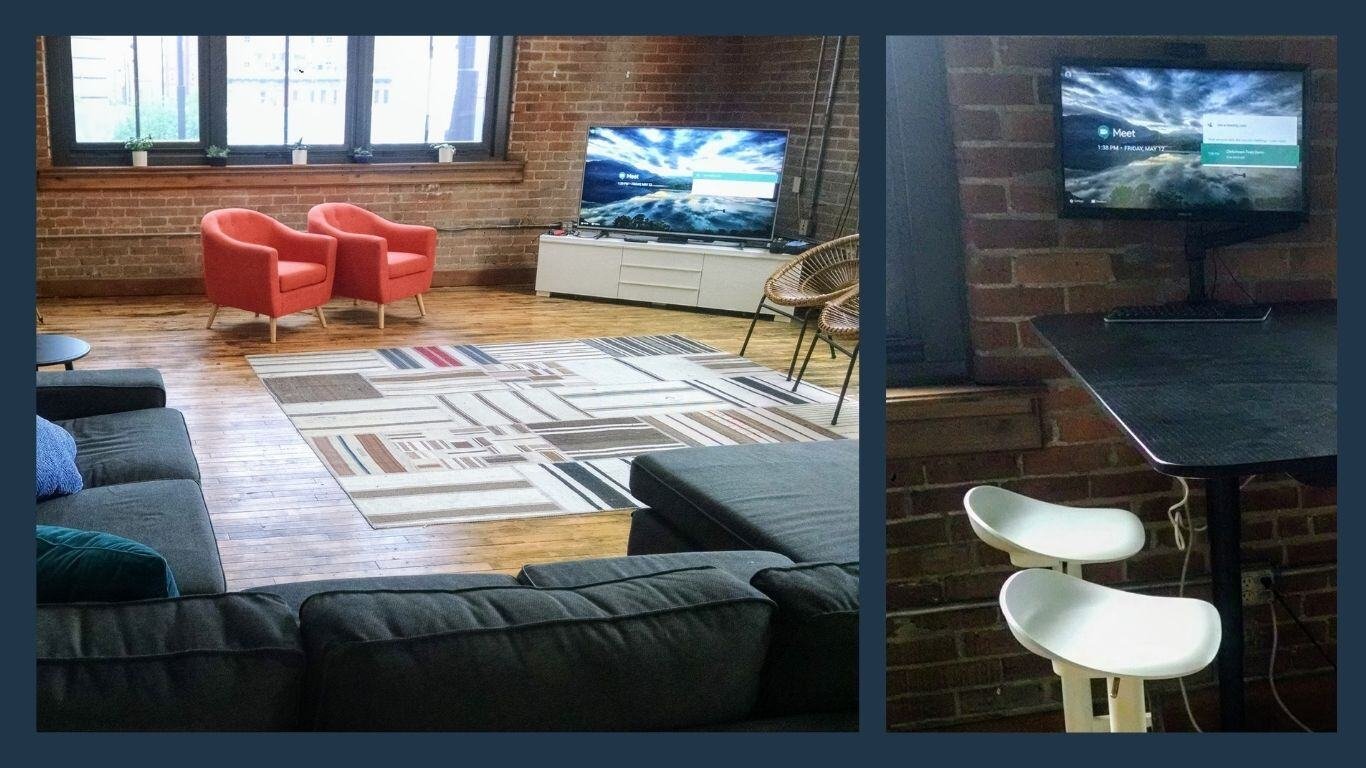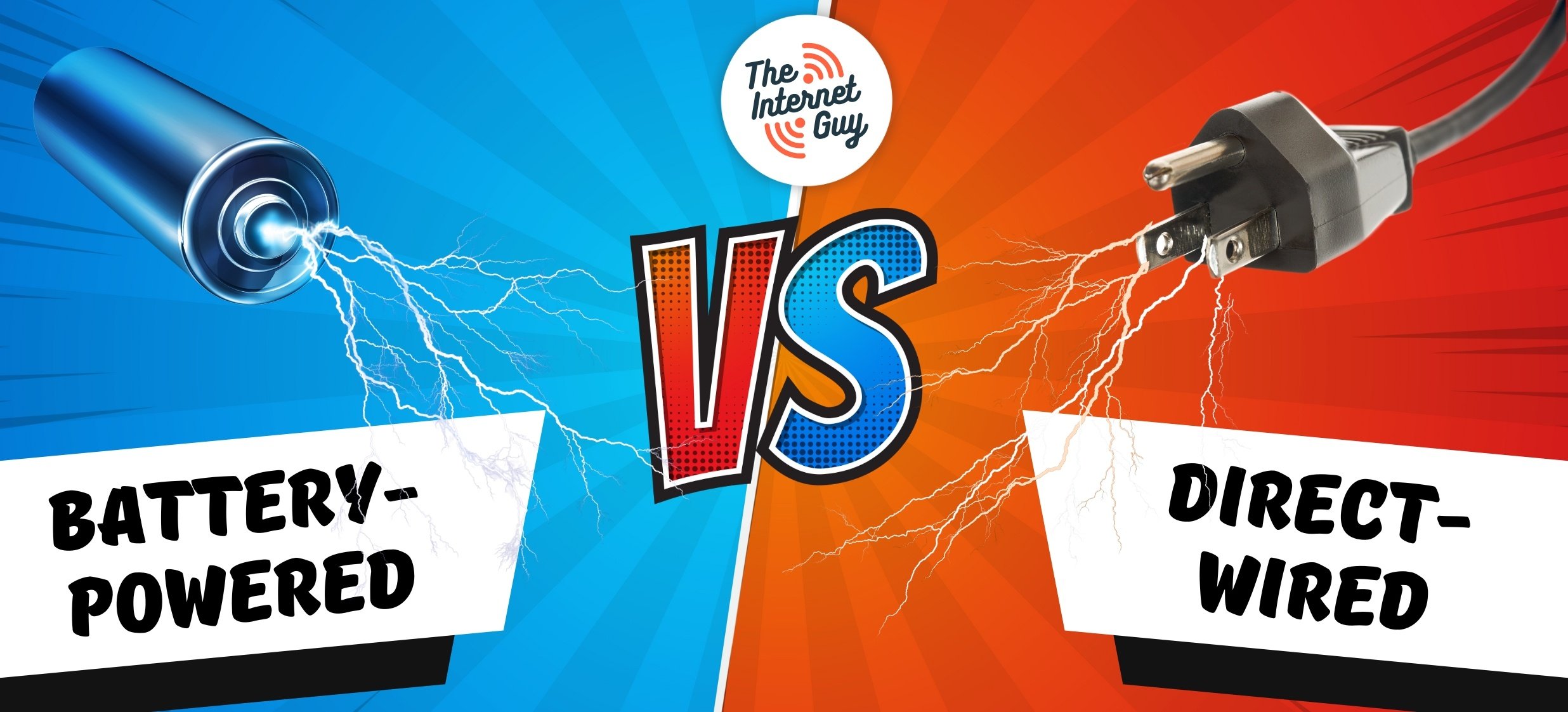
Battery-Powered VS Direct-Wire Security Cameras. Which works best for you?

When people look for a security camera solution, most times battery-powered security cameras come up as a leading option. Everyone likes how easy they are to install and how they can be installed by the homeowner with relative ease.
But compared to direct-wired cameras that have a consistent power source, battery-powered cameras come with many disadvantages that are not often discussed. While there are certain scenarios where they are helpful, I recommend that you still consider direct-wired cameras as an option first. Let's go over why:
Challenges with Battery-Powered Security Cameras
These are the common issues people discover after using battery-powered security cameras over time.
Inconvenient Recharging
When it is time to charge, most will give you a notification a few days before it can no longer function. So, if you're not monitoring battery life, you will need to check and recharge them before you do any traveling.
Also, recharging can involve taking the camera down off of its magnetic mount to bring it closer to a power outlet. There are some models that have swappable batteries instead, allowing you to purchase extra batteries you can simply swap out, adding to the overall expense.
If you place your camera in heights where they are hard to tamper with or steal, then your ritual of recharging cameras will also involve moving around and climbing a ladder each time. As someone who tries to avoid climbing ladders whenever possible, this was one of the main factors for my home set up.
Slower Notifications
To maximize the longevity of the battery charge, these types of cameras tend to be more miserly with data as WiFi is fairly power-hungry. When using a camera operating purely off of battery mode, you may experience delays of several minutes before your phone receives a push notification. This is due to the camera only sending data in bursts, instead of constantly, to keep the power consumption down.
In comparison, having a constant power source allows the camera to keep the connection active and can send notifications immediately.
Requires a Strong WiFi Signal
Battery-powered Cameras also tend to run into more issues with weak or spotty WiFi signals, as they have to manage the power to connect to WiFi more carefully. So, if your Camera location and your Router are on opposite sides of the house, your camera may be inconsistent or even inoperable.
More temperamental in extreme weather
In the heat of the summer and the cold of the winter, extreme temperatures can shorten the battery life of cameras as they protect themselves from being damaged by those extremes.
In 80-100 degrees heat or in direct sunlight, cameras can turn themselves off in order to prevent overheating. While in freezing temperatures or in very shady locations, cameras may work extra hard or turn on their IR Lights to keep warm enough to operate.
Less Features
Certain features, especially AI-Powered ones like Face Detection, require more power than battery-powered cameras can provide and still maintain their claimed battery life. When you set up your cameras, if it supports advanced features, you will get the option to extend battery life by disabling them or keep them enabled but have to recharge more frequently.
Benefits of Battery-Powered Security Cameras
There are still plenty of scenarios where battery-powered security cameras can be helpful and direct-wired cameras are not. Here's where battery-power excels:
Install anywhere where there isn't power
This one is the most obvious, sometimes you want a camera where power simply isn't available or isn't reliable. Sheds, Construction Sites, detached or remote parts of the house can all benefit from having a security camera that is energy independent.
Renter Friendly
Renters can benefit from battery-powered cameras as they are the least damaging way to add security cameras. Their lightweight nature allows for mounting options as simple as double-sided tape, and uninstalling them when it is time to move is relatively easy and damage-free.
Energy Efficient / Solar Options
Battery-powered Security Cameras tend to use much less energy and have more aggressive power-saving modes than direct-wire cameras provide. This can be helpful if you want to install cameras in a location where you have to be careful of your overall power usage.
Temporary Solutions
Sometimes you need to move your cameras around, this is another area where battery-powered cameras shine. Being able to move them from outside to inside seasonally as activities change or using them on an RV where you only want cameras to be outside when you are stationary are all scenarios where battery-powered cameras are the only option.
Convenient Wired Camera Options
If you still don't want to run a power cord to your security camera, there are some direct-wire options you should consider that bring back some of the ease that battery-powered cameras provide.
Doorbell Cameras
These security cameras replace your doorbell and pull powered directly from your house using the existing doorbell power supply. For most modern homes, installation can be as easy as cutting power, swapping the doorbell, and installing a chime kit and can be completed within a day by homeowners.
A great option if your primary concern is related to people accessing the home or keeping an eye on packages left from online orders.
Floodlight Cameras
Similar to Doorbell Cameras, Floodlight Cameras can replace your existing floodlights and use the power supply that already exists. They also come with built-in lights, so you still have consistent lighting, and add features such as motion activated lighting, scheduled lighting, and App or Voice Assistant control of turning the lights on or off.
Keep in mind that if your floodlight is on a light switch, that you keep the switch on and control the flood lights either by the manufacturer app or other smart device control. Otherwise, you may inadvertently turn off the security camera. I like to use Locking Toggle Light Switch, which requires a small tool to turn off, to ensure that no one accidentally turns off the camera but still gives me the option to easily do power resets.
PoE IP Cameras
PoE, or Power-over-Ethernet, IP Cameras use a single Ethernet cord to supply both power and data connections to each camera. While it's the most intensive install option on this post, they are the most reliable option as they don't require a WiFi connection and are hard to tamper with.
Since PoE is considered low-voltage, this also means you don't need to hire an electrician for the installation and can install into locations without traditional power points. Just keep in mind that you need to use them with a PoE-capable NVR (Networked Video Recorder), Switch, or a PoE-injector that will add power to a standard, data-only Ethernet connection.
If you find yourself in the deep end when it comes to picking a Security Camera option or are running into issues getting the cameras you have to perform how you want, The Internet Guy is your local expert that can get you up-and-running without any headaches. Contact us today to schedule an in-person or virtual consultation.


